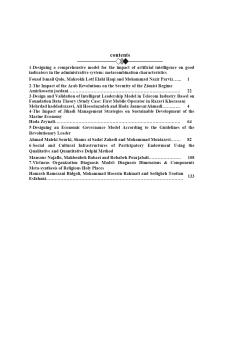Designing a comprehensive model for the impact of artificial intelligence on good indicators in the administrative system: metacombination characteristics
Subject Areas : Islamic governance
Fouad Ismail Qalo
1
![]() ,
Mahrokh Lotfollahi Haggi
2
*
,
Mahrokh Lotfollahi Haggi
2
*
![]() ,
Mohammad Nazir Parviz
3
,
Mohammad Nazir Parviz
3
1 - PhD Student, Department of Management, Urmia Branch, Islamic Azad University, Urmia, Iran
2 - Department of Management, Urmia Branch, Islamic Azad University, Urmia, Iran
3 - PhD Student, Department of Management, Tabriz Branch, Islamic Azad University, Tabriz, Iran
Keywords: artificial intelligence, rulers, governance indicators, system, administration,
Abstract :
Artificial intelligence, as an advanced technology, is increasingly being integrated into various parts of the administrative system with the potential to revolutionize the way decision makers and politicians work and provide better services to citizens. However, its implementation should be aligned with the principles of good governance to ensure transparency, accountability, equality, effectiveness and more efficiency in these fields. Methodology: The current research is a type of documentary and secondary studies, and the required research was 412 articles from the scientific database from 1984-2024. Also, data analysis was done using the method of Sandelowski and Barroso 2006.
Findings: After the data integration stage, 26 sub-components and 162 codes were extracted from the 6 main components.
Conclusion: Based on the findings, it was determined that the efficient structure, sustainable development and infrastructure management had the highest coefficient of importance, and according to Figure 9, the artificial intelligence framework and good governance index were presented in the administrative system.
1) Alshadoodee, H. A. A., Mansoor, M. S. G., Kuba, H. K., & Gheni, H. M. (2022). The role of artificial intelligence in enhancing administrative decision support systems by depend on knowledge management. Bulletin of Electrical Engineering and Informatics, 11(6), 3577-3589.
2) Brynjolfsson, E., and Mcafee, A. (2017). The Business of artificial intelligence. what it
can-and cannot—do for your organization. Harvard Bus. Rev. 7, 3–11.
3) Corea, F., Fossa, F., Loreggia, A., Quintarelli, S., & Sapienza, S. (2023). A principle-based approach to AI: the case for European Union and Italy. Ai & Society, 38(2), 521-535.
4) Crawford, K. (2021). The Atlas of AI: Power, Politics, and the Planetary Costs of Artificial Intelligence.
5) Dafoe, A. (2018). AI Governance: A Research Agenda. Oxford: Governance of AI
Program, Future of Humanity Institute, University of Oxford.
6) Finfgled Connett, D .(2006). Meta Synthesis Of Presence in Nursing. Journal of Advanced Nursing, 55(6), 708-714.
7) Floridi, L., Cowls, J., King, T. C., and Taddeo, M. (2020). How to design
AI for social good: seven essential factors. Sci Eng Ethics 26, 1771–1796.
doi: 10.1007/s11948-020-00213-5
8) Floridi, L., Cowls, J., Beltrametti, M., Chatila, R., Chazerand, P., Dignum,
V., et al. (2018), AI4Pe.ople—an ethical framework for a good ai society:
opportunities, risks, principles, and recommendations. Minds Machines 28, 689–707.
doi: 10.1007/s11023-018-9482-5
9) Ghasemi, A. R., Rayat Pisheh, M., A. (2016). Presenting a model for supply chain
sustainability assessment using meta-synthesis approach. Executive Management, 14, 91–112.
10) Lynskey, O. (2017). LSE law Brexit special #7:Brexit and the UK’s tech industry (Policy Brief No. 26–2017; LSE Law Policy Briefing Series, pp. 1–4). The London School of Economics and Poltical Science (LSE). https://www.ssrn.com/abstract=2941375
11Moti, D. D. (2021). The Implementation of Good Governance Practices in Service Provisions to the Citizens in Addis Ababa City Administration: The Case of Yeka Sub-City. Acta Humana–Emberi Jogi Közlemények, 9(1), 7-27.
12) Nowik P. Electronic personhood for artificial intelligence in the .workplace. Comput Law Secur Rev 2021:42 doi:10.1016/j.clsr.2021.105584
13) Roberts, H., Babuta, A., Morley, J., Thomas, C., Taddeo, M., & Floridi, L. (2023). Artificial intelligence regulation in the United Kingdom: a path to good governance and global leadership?. Internet Policy Review.
14) Rahwan, I., Cebrian, M., Obradovich, N., Bongard, J., Bonnefon, J. F., Breazeal, C Wellman, M. (2019). Machine behavior. Nature, 568(7753), 477–486
15) Sandelowski M, Barroso J.(2007). Handbook for Synthesizing Qualitative Research. Springer Publishing Company; 2006. 311 p.
16) Schlesinger, P. (2022). The neo‐regulation of internet platforms in the United Kingdom. Policy & Internet, 14(1), 47–62. https://doi.org/10.1002/poi3.288
17) Sigfrids, A., Nieminen, M., Leikas, J., and Pikkuaho, P. (2022). How should public
administrations foster the ethical development and use of artificial intelligence? A
review of proposals for developing governance of AI. Front. Hum. Dynamics 4, 858108.
doi: 10.3389/fhumd.2022.858108
18) Taeihagh, A. (2021). Governance of artificial intelligence. Policy Society 40, 137–157.
doi: 10.1080/14494035.2021.1928377
19) Ulnicane, I., Eke, D. O., Knight, W., Ogoh, G., & Stahl, B. C. (2021). Good governance as a response to discontents? Déjà vu, or lessons for AI from other emerging technologies. Interdisciplinary Science Reviews, 46(1-2), 71-93.
20) Wipo. (2019). WIPO technology trends 2019: Artificial intelligence. Geneva: World Intellectual Property Organization
21) Wirtz, B. W., Weyerer, J. C., and Kehl, I. (2022). Governance of artificial
intelligence: a risk and guideline-based integrative framework. Gov. Inf. Q. 39, 101685.
doi: 10.1016/j.giq.2022.101685
22) World Bank (2018). GovernanceIndicators , Available at: https://info.worldbank.org/governance/wgi/
23) Yap Kioe, Sheng (2009). "What Is Good Governance", United Nations Economic and Social Commission for Asia and the Pacific (UNESCAP), 1-3
24) Zuboff, S. (2019). The Age of Surveillance Capitalism: The Fight for a Human Future at the New Frontier of Power. New York, NY: Public Affairs.

